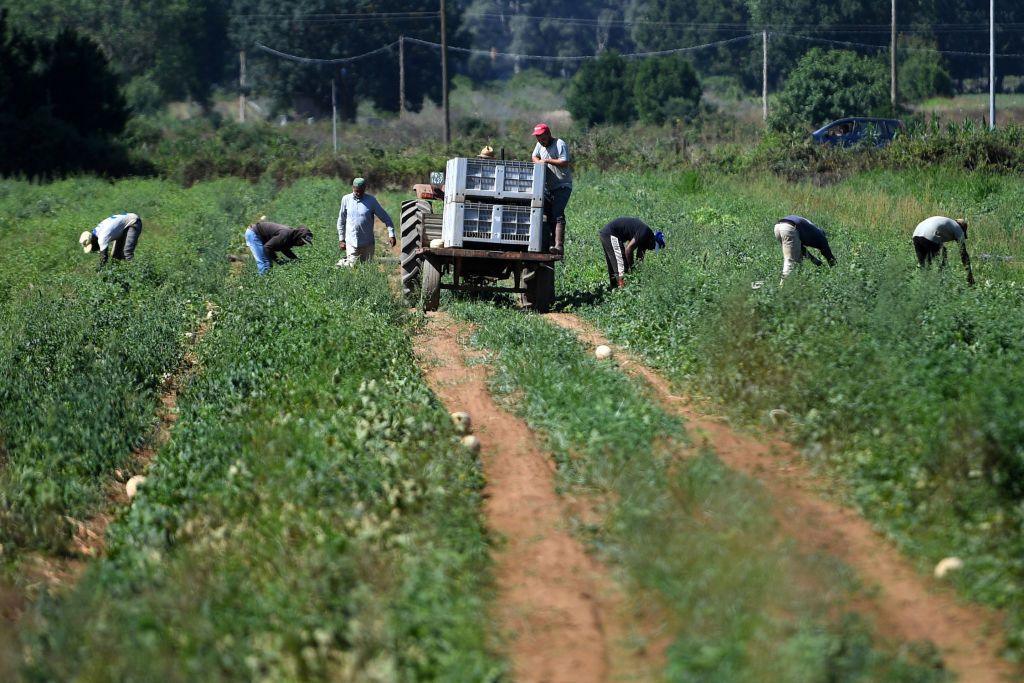Farm labourer dies in Italy after arm severed by machine

Migrants labourers work in fields south of Rome (file pic)
- Published
An Indian farm labourer in Italy has died after he was allegedly left on the side of the road following an accident in which his arm was severed and his legs crushed.
Satnam Singh was injured by heavy machinery while working in a vegetable field in Lazio, near Rome, on Monday.
According to Italian media, Mr Singh’s employer, Antonello Lovato, loaded him and his wife into a van and left them by the side of the road near their home.
The severed arm was placed in a fruit box.
Medical help did not reach Mr Singh until an hour and a half later. He was airlifted to a hospital in Rome but died on Wednesday.
Mr Lovato is now under investigation for criminal negligence and manslaughter.
Mr Lovato's father told Italian media: "My son had told [Mr Singh] not to go near the machinery, but he didn't listen."
Italy’s Minister of Labour, Marina Calderone, said death of Mr Singh had been an “act of barbarity”.
Mr Singh, who was in his early 30s, had reportedly been living and working in Italy as an undocumented migrant for around two years.
The Indian embassy in Italy said it was “deeply saddened by the unfortunate demise of an Indian national” and added it was “actively liaising with local authorities.”
The Flai CGIL trade union has called for a strike of agricultural workers on Saturday to protest the death of Mr Singh. Maurizio Landini, the union's secretary general, said: "We are faced with a situation of real slavery. The death of a worker - an undocumented worker - is of unprecedented gravity."
The area Mr Singh worked in is home to large agricultural farms and a substantial Punjabi and Sikh population, many of whom work as farmhands.
Undocumented labourers across Italy are often subject to a system known as “caporalato” – a gangmaster system which sees middlemen illegally hire labourers who are then forced to work for very low salaries. Even workers with regular papers are often paid well below the legal wage.
Almost a quarter of the agricultural workforce in Italy in 2018 was employed under this method, according to a study by the Italian National Institute of Statistics. The practice also affects workers in the service industry and building sectors.
The exploitation of farmhands – Italian and migrant - in Italy is a well-known issue.
Thousands of people work in fields, vineyards and greenhouses dotted across the country, often without contracts and in highly dangerous conditions.
Workers often have to pay their employers for the cost of transportation to and from remote fields. Many live in isolated shacks or shanty towns and typically have no access to schools or medical care.
The practice of caporalato was outlawed in 2016 following the death of an Italian woman who died of a heart attack after working 12-hour shifts picking and sorting grapes, for which she was paid €27 (£23) a day.
However, the exploitation of agricultural workers has proven difficult to eliminate entirely.
In 2018, 16 agricultural workers were killed in two separate road crashes in the region of Puglia.
In both cases, lorries carrying tomatoes collided with vans carrying the labourers home after their day's work. The deaths led African migrant labourers to go on strike to protest poor working conditions .
And earlier this month, two people were arrested in Puglia for caporalato after they were found to have recruited, underpaid and exploited several dozen workers.